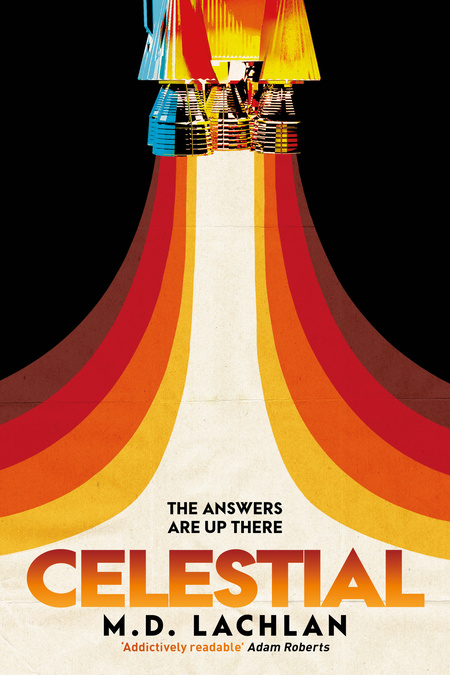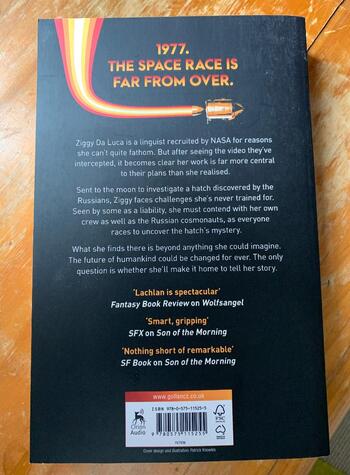It’s a tricky business delivering up mystery and explanation in one tight sci-fi storytelling package.
Tip too towards the mystery and you end up with Solaris or Arrival, both fine films in their own way which are hampered by the fact that they deliver up far more questions than answers – if you’re the type of person who loves dangling question marks, you’ll be thrilled; if not, well … – and to far towards the other and all the thrill of wondering what it all means is sapped from the storyline with banality-enhancing speed.
Celestial by M. D. Lachlan, the pen name of Mark Barrowcliffe, doesn’t fully dodge the quagmire of mystery vs. explanation but what it does do well is take a deep dive into what makes us human, and how we are a sometimes debilitating but often survivable mix of past trauma and present living.
This is a pertinent thing to explore in a novel which calls upon many of its characters, Russian and American alike, to reach deep into their souls and figure out just who they are and how they came to be these people if they are to survive some pretty remarkable current challenges.
And what incredible challenges they are.
Set in 1977 at the height of the Cold War where mistrust and geopolitical competitiveness is wound super taut, Celestial primarily focuses on Ziggy Da Luca, a Tibetan-American linguist with a specialisation in ancient writing and mystical beliefs, who finds herself employed by NASA for reasons neither she nor her often dismissive colleagues can determine.
She looks at her hands; they’re shaking.
‘You’re sending me to the Moon?’
‘Yeah. How are you with a gun?’
It’s not until her boss calls her into her office, not to fire her which is what he often does to people summoned to his work digs, but to give her the mission of a lifetime – find out what the hell is up on the moon and why it might just indicate we are very much not alone in the universe.
A video shot by Russians and intercepted by American intelligence shows a hatch on a spaceship-sized entity in the Taurus-Littrow crater, into which have entered two Russian cosmonauts who have yet to resurface quite a period of time later.
Driven by the need to get a hold on whatever technology, read weapons, sits within the likely ancient structure – here’s where Ziggy’s expertise comes into its highly relevant own – before the Russian do, the U.S. launches a mission to the moon well after the golden age of lunar exploration, hoping that their team can get to the hoped-for bounty before their enemies do.
Fun fact: So weird and strange is the craft into which they, and later the Russians, clamber that they end up having to work together to get to the bottom of whatever the hell is mysteriously at the heart of a craft which seems to be more a reflection of their conscious and subconscious fears than it is anything else.
In many ways, being on board the craft is a trippy excursion deep into the darkest parts of the soul, which might be fine, nightmarish manifestations side, if Ziggy didn’t have the loose cannon of Steve Griffin in her team, a man clearly scarred by his time as a prisoner of war of the Viet Cong who is virulently racist, violent and dismissive of her as a colleague and a human being.
He is bad news, only on the mission because he’s good at repressing all that pain and turmoil, and just how bad becomes clear when the craft begins to take their hopes and dreams, memories, trauma and fears and gives their corporeal form, plunging them into an Alice in Wonderland-meets-Annihilation trip to the very worst places a person can go.
That would be bad enough but in-between trying to sort out the real from the fake and work out who can be trusted and who can’t, Ziggy and the others have to find a way to simply get home, back to the lives they left behind, which in Ziggy’s case involves her wonderful fiancé Andy who she’d very much like to see again.
But to do that, she and Griffin and a number of new Russian compatriots, united by the need to survive and then some shared experiences of the strangest and darkest parts of themselves, have to find a way out, something that will require them not simply to scale the internal apparatus of the craft but also some challengingly terrifying, deeply held parts of themselves.
‘I will see,’ says Ziggy. The dakini knife hovers above her head. Its presence feels more familiar; she has a sense now of how to use it. It’s not meant for her companions, even for Kovacs.
She feels its sharp edge in her mind, sees it twinkling in the starlight. Then she allows it to fall, swift and true, on herself.
While Celestial is a damn good read that marries action and existential introspection to an impressively immersive degree, it does suffer from spending a little too much time lost in the harrowing mystery of it all.
Fun though it is to conjure up what a craft that can summon the most interior parts of the people within it would be like, from malleable tunnels to strange caverns in which ships sail to islands of trees and animals that change on the whim on the person projecting onto them, it all starts to feel a little too drawn out.
As a feat of imagination and a heart-stirring exploration of what it’s like to be a broken, flawed human who still wants good things from life but whose pain is preventing them from fully entering into it (Ziggy is exhibit A in the regard and has a lot to make peace with), Celestial is magnificent, a marriage of pedal-to-the-metal storytelling and the dark night of the soul that largely works.
What it does lack is balance between the mystery and what it might all mean, and while we get a solid idea of where it’s all leading by the end, it still feels like it gets lost in its own summoned nightmares and twisted realities, it does get bogged in the middle, not to a terminally unreadable degree but bogged down nonetheless.
Still, as novels go, Celestial is cleverly insightful and bravely out there, a story that brings together tantalising notions of what it might mean if aliens were influential in Earth’s development, how we struggle when the repressed past rises up to rent asunder the barely held together present, and whether we can heal and move on and what that might look like when someone has just turned our souls inside out and we have to find a way to survive that and get home against some bizarrely, possibly therapeutic odds.

